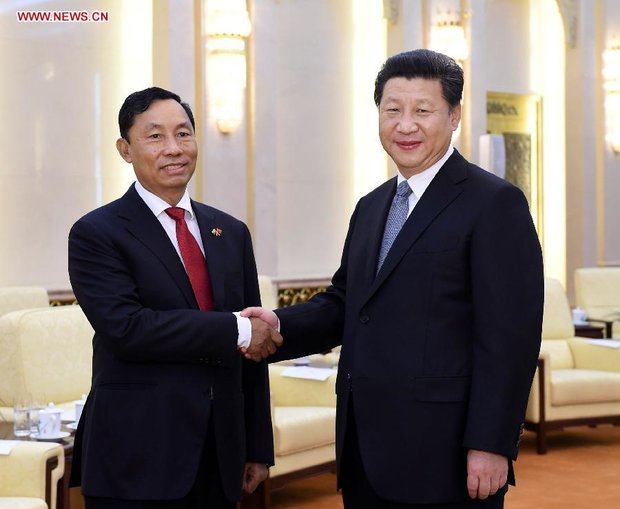Many in Beijing’s politburo had been anticipating an alliance between Burma’s opposition leader Aung San Suu Kyi and House Speaker Shwe Mann to lead the country after the November elections, and were “shocked” when he was ousted from his position, say sources close to the Chinese government.
In a further revelation, it appears that many within the Chinese leadership knew at least three days ahead of Shwe’s Mann’s dismissal that he was facing the chop.
Speaking on condition of anonymity, three sources have confirmed that they were informed about an “internal coup” within the ruling Union Solidarity and Development Party (USDP) ahead of the incident last month, when Burmese security forces surrounded the USDP headquarters in Naypyidaw while police “guarded” Shwe Mann at his home in a middle-of-the-night operation on 12- 13 August.
The sources in China say that a personal assistant to retired military strongman Than Shwe had leaked information to them in late July or early August, saying that Shwe Mann was now seen as a “betrayer” in the eyes of Than Shwe, and “would soon be sacked”.
“Beijing was shocked because the majority expected and accepted that U Shwe Mann and Daw Aung San Suu Kyi had formed an alliance that would rule the country after the 2015 elections,” said one source.
“The majority in Beijing supported a Shwe Mann-Suu Kyi coalition,” said another source. “However, the [Chinese] Ministry of Foreign Affairs seriously overestimated it.”
In addition to senior figures at China’s foreign affairs ministry, members of the National Security Department and military were also reportedly informed of the intended purge of the USDP chairman.
The sources declined to elaborate on exactly what preparations Beijing had made for such a new ruling partnership in Burma, nor whether any senior figure within the Chinese government had discussed such a scenario with the pair.
Suu Kyi visited President Xi Jinping and Prime Minister Li Keqiang in Beijing in June – a meeting seen as a move by China to establish a line of communication with the Burmese opposition leader, who most believe will lead her party, the National League for Democracy (NLD), to victory in the polls later this year.
Shwe Mann has visited China no less than seven times in an official capacity, the last time in April, while he held dual positions as Union Parliament house speaker and chairman of the ruling party.
A Burmese activist, who also insisted on anonymity, confirmed that the USDP reshuffle – which also saw USDP General Secretary Maung Muang Thein purged – was leaked to the Chinese a few days before it happened.
“The Burmese military was conducting a small coup in order to avoid a bigger one after the elections,” said a Chinese source.
Meanwhile, Chinese Premier Li and President Xi both hosted Burmese President Thein Sein on Friday, while he was in Beijing to attend a commemoration ceremony marking the 70th anniversary of the end of World War II in China.
[related]
According to Chinese state media Xinhua, Prime Minister Li called for joint efforts to maintain stability in common border areas, and expressed China’s hopes that the Burmese government would continue playing a constructive role in promoting the China-ASEAN relationship.
Relations between the two countries have been strained in recent years as Thein Sein’s government increasingly looks to other nations for foreign investment.
In addition, the Burmese army’s ongoing conflict with Kokang rebels along the Chinese border has at times spilled over into Yunnan Province, drawing the ire of Beijing.
A leading Chinese academic said he believes the power struggle within the USDP will ultimately impact upon Sino-Burmese relations.
Hongwei Fan, a professor of research at the School of Southeast Asian Studies in Xiamen University, said he believes that China will realign its policy towards Burma after the November elections, and will cease playing its traditional role of non-interference.
“I think Beijing has evaluated Naypyidaw’s policy changes towards China and is adjusting its traditional non-interference policy accordingly,” he said. “This will come into play after the general election at the end of this year.”



